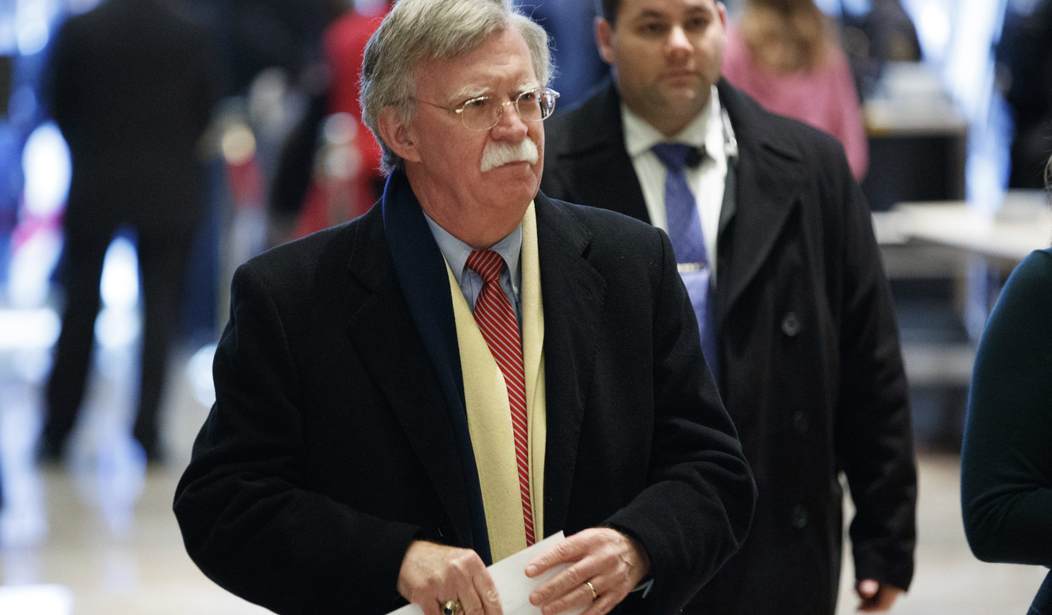WASHINGTON – Former U.S. Ambassador to the United Nations John Bolton, who is reportedly on President Trump’s consideration list for the next national security advisor, said he does not think the Trump administration will be able to break up Russia and Iran’s alliance.
“I don’t see how. They both are and have been strong supporters of the Assad regime. Russia is not going to back away from that regime,” Bolton said after his recent speech at a United Against Nuclear Iran (UANI) and the Jewish Institute for National Security of America (JINSA) Capitol Hill briefing about the future of Iran policy.
“It wasn’t because of the Tartus [Syria] base. It’s now not because of Latakia [Syria]. And for Iran, keeping Assad in power and keeping it linked with Hezbollah and, you know, destroying ISIS so they can link up the Baghdad government, this is their arch of power through all four countries, so the odds of splitting them over that and the many other ties they have developed in terms of military sales and so on, I just see it as remote,” he added.
The State Department has designated Iran a state sponsor of terrorism. Bolton, who served in the Bush administration, was asked if President Trump’s rhetoric on working with Russia could impede efforts to combat the Iran regime’s nuclear program and its other conduct.
“I look forward to the day he has a conversation with Putin about Iran and I think a lot of things may change at that point, because the confluence of Russian and Iranian influence has been noteworthy for 15 years and it’s not in the U.S interest. It’s just not,” Bolton replied.
PJM asked Sen. Cory Gardner (R-Colo.) the same question. In his answer, Gardner referenced a letter that he wrote along with other senators to Trump about adopting a tougher policy toward Russia.
“Every president in recent history has tried to start talking to Russia: President Obama did, President Bush did, President Trump did. But there are certain lines we cannot cross and certain things we cannot allow Russia to skate by with and that needs to be made clear. So do I think it’s good to talk about things of mutual interest? Yes. Do I think it’s bad to give up on national interest? Yes,” he said.
Bolton lamented the design of the Iran nuclear deal for making it “almost impossible” to reimpose economic sanctions against Iran.
“The assets that were frozen are gone. The sanctions themselves imposed as a result of Security Council resolutions are going to be difficult if not impossible for the Europeans to stomach again, and the regime in Tehran knew that from the get-go,” he said.
“I think the path to making it impossible for Iran to get nuclear weapons economically is now nearly out of the question, and because the regime is close enough after all these years of effort to getting that nuclear device in production I think you’ve got to look at other alternatives,” he added.
Bolton suggested regime change as the best way to prevent Iran from acquiring a nuclear weapon.
“It should be declared American policy to overturn the regime in Tehran because that is the only way, ultimately, that you will get Iran to back off the pursuit of nuclear weapons,” he said. “Any regime that arms and supplies terrorists is perfectly capable of giving a nuclear device to a terrorist group.”
Bolton said international powers have to “contemplate” the use of military force in order to prevent an Iran with nuclear weapons.
“Nobody says this is an attractive alternative. Nobody is looking to find a way to do it,” he said. “We are just about out of time and we have tried every other possibility.”
Gardner offered his opinion on the next steps the U.S. should take after Iran’s missile tests.
“The start of sanctions on the 25 individuals and organizations on Feb. 3 was a good start, but we can continue to clamp down and focus on those who are empowering and enabling the missile development and armaments proliferation, whether that’s individual businesses that are financing. We need to find them, we need to sanction them and we need to get our partners to agree,” he said.
Gardner elaborated on his call for the United States to provide Israel with additional support to address threats posed by Iran.
“Now as Iran continues to flex its muscles, showing complete willingness to reach not just Israel with delivery capabilities but eastern Europe, perhaps even someday the United States – that relationship, that investment is more important than ever,” he said.









Join the conversation as a VIP Member